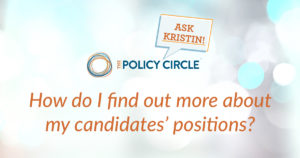Dear Kristin,
With midterm elections taking place in November, and the primaries now taking place across the nation to determine who appears on the November ballot … I see so many political ads. How can I go beyond the headlines to really learn about my candidates’ positions?
 I feel you; political headlines quickly feel overwhelming. It is helpful to take a step back from the headlines and think through what you really want to know about these people who will be making policy decisions on your behalf.
I feel you; political headlines quickly feel overwhelming. It is helpful to take a step back from the headlines and think through what you really want to know about these people who will be making policy decisions on your behalf.
Need ideas of what to research on a candidate? Look for their voting history, previous work experience, and the public endorsements that he or she has received. While researching a candidate, it is helpful to note what has been written about the candidate from various news outlets. If overtly negative or positive news stories pop up first, keep looking to see if you can find the opposite point-of-view.
It is also a good idea to go to the candidate’s website to see what positions they have staked out publicly. Those are positions voters will hold them to if they are elected. If you have remaining questions, email the candidate or reach out to his or her campaign office with your questions.
Here are some example questions you might want to ask to get a better sense of who they are and what they stand for:
- Why are you running?
- What is the best system for people to create a future for themselves and their family?
- What should the role of government (or agency they are running for) be?
- What is your view on _____, _____, and ________? (Ask about the most pressing issues in your state, e.g. the debt, or pension, or infrastructure.)
- How will you work with your colleagues if you are elected?
Many ‘ballot guides’ exist that can serve as a one-stop-shop for a lot of the information outlined above. A couple examples include Ballotready.org or a specific interest group like the National Federation of Independent Businesses (NFIB) Voter Guide. While the voter guides can be very informative, it is generally advisable to do some of the research on your own so you know where the information is coming from and understand the various points of view at play in the debate.
In summary, the key is to spend a little bit of time gathering information from various sources and news outlets to gain a fair understanding of who the candidate is and their policy positions.
Check out The Policy Circle Election Resource Guide on Assessing Candidates for more ways to make sure you have the facts in addition to all of the opinions out there. After a roundtable discussion on assessing candidates, members of your Policy Circle may consider meeting the candidates themselves!
Do you have a question for Kristin? Send Kristin and email at kjackson@thepolicycircle.org to get your election questions answered.
Recommend a Circle Leader. Especially in Georgia, California, Wisconsin, and Michigan, Kansas and Arizona where circles are sprouting.
Start a Circle in your community. Your community may be your profession or your neighborhood, or both. Grow professionally, The Policy Circle is a simple way to practice the language of leaders with the facts and the space to be at ease with weighing in on the impact of policy.
Invest in The Policy Circle. Together let’s build a network of women who want to be part of the dialogue on the impact of policy in their lives.
The Policy Circle is a 501(c)3 that provides a fact-based, nonpartisan framework built to inspire women living in the same community to connect, learn about and discuss economic policies that impact their lives. Women across the nation are taking a leadership role in the public policy dialogue on what human creativity can accomplish in an open economy.
